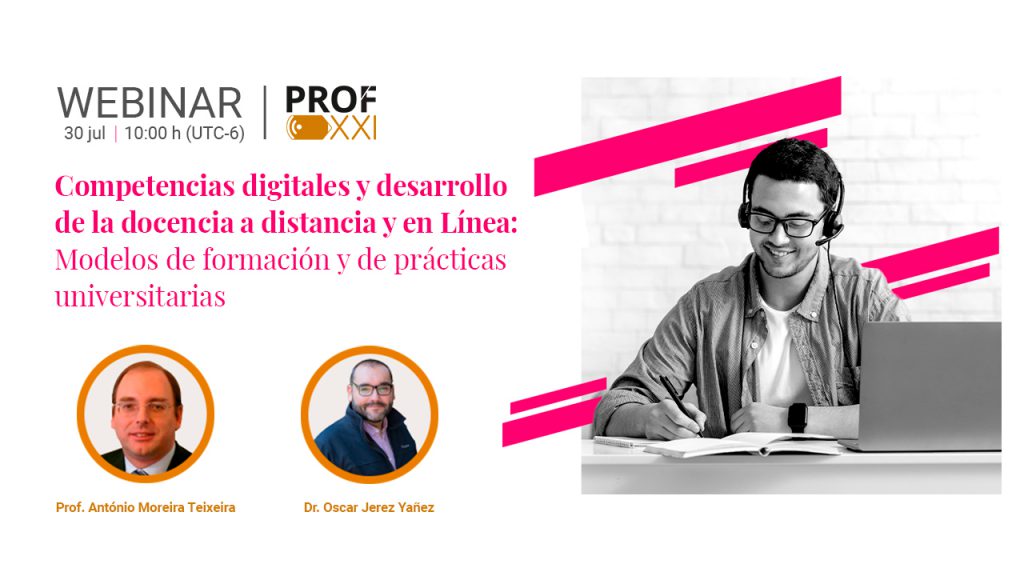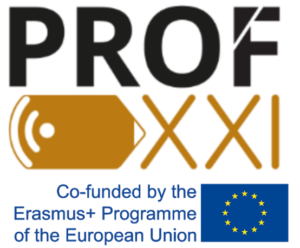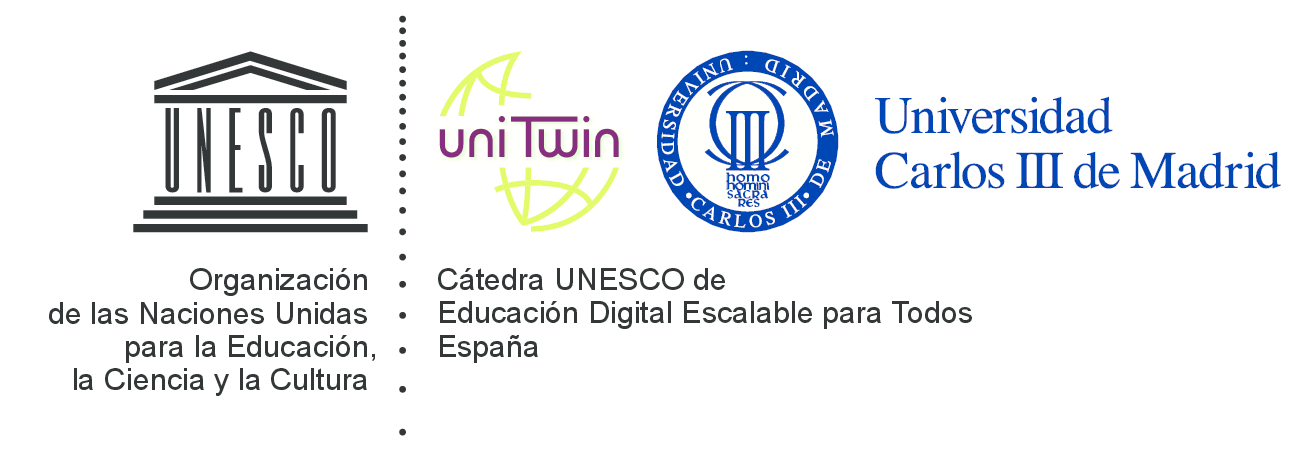With a total of over 5,000 attendees, the first cycle of PROF-XXI webinars has concluded, contributing to the development of university educational innovation throughout Latin America.
Due to the impact of the COVID-19 pandemic, education worldwide has faced several challenges in transitioning from traditional in-person education to emergency remote learning.
To provide support for university teaching during this health emergency, a series of eight webinars were held within the European framework of digital competencies for educators as part of the PROF-XXI project.
Impact of PROF-XXI Webinars
The webinars began on June 11 and concluded on July 30, with the first seven webinars attracting 14,743 registrants, averaging over 2,000 attendees per webinar.

In total, 5,810 individuals attended the webinars, with an average of approximately 830 participants per webinar.
It’s worth noting that there were an average of 27,701 views on YouTube, with 3,957 views per webinar.

The participating countries included Mexico, Honduras, Guatemala, El Salvador, Nicaragua, Colombia, Ecuador, Peru, Chile, Spain, Portugal, and France.
The series of webinars was delivered by expert professionals representing various universities that are part of the Erasmus+ PROF-XXI project, including:
- Universidad Carlos III de Madrid
- Universidade AbERTA
- Universite Toulouse III Paul Sabatier
- Universidad Galileo
- Universidad de San Carlos de Guatemala
- Universidad de San Buenaventura Cali
- Universidad del Cauca
Carlos Delgado Kloos, Coordinator of the PROF-XXI Project, expressed, «With this, PROF-XXI aims to contribute to the development of university educational innovation.» He also added, «The project began this year and will continue for a duration of three years until 2022 for the Development of Teaching and Learning Centers. What we also want is to promote interest in these topics in the Latin American region.»
Webinar: Digital Competences and the Development of Distance and Online Teaching, models of training, and university practices.

The eighth and final webinar was led by professionals Prof. Antonio Moreira Teixeira from Universidade AbERTA and Dr. Oscar Jerez Yañez from Universidad Católica de Chile.
«The technology on its own changes nothing, but in the hands of trained teachers, it can transform the learning process.»
This quote was presented by Prof. Antonio Moreira Teixeira as an analysis of the importance of teacher training in the current context of teaching and learning.
«Despite the fact that there has been a lot of training in the last two decades, most teachers were not prepared for the challenge in this dimension and with this type of impact and pressure.»
Teacher Digital Competence

He then presented two more quotes that describe what digital competence is:
«Teacher digital competence is related to all the skills, attitudes, and knowledge required by teachers in a digitized world.» (Cabero-Almenara, Estrada-Vidal, and Gutiérrez-Castillo 2017 Marques 2014)
It is also related to the use of ICT (Information and Communication Technologies) from a didactic-pedagogical perspective in an educational professional context.
Additionally, it has an impact on learning strategies directly or indirectly related to technology. (García Tartera, 2016).

Professional Competences
Professional competences have four dimensions, including:
Organizational Communication: Refers to how the teacher communicates within the organizational culture, and how this is done in a completely digital or partial environment.
- Professional Collaboration: This is related to interaction and collaborative work with colleagues, exchange of experiences, among other aspects.
- Reflective Practice: It is of great importance in the digital context where it is facilitated, and it also involves sharing experiences and reflecting on teaching practice.
- Teacher Training: Related to the digital training context to develop their competences.

Digitalization Strategy
The expert explained that the collaborative aspect of a traditional class can be transferred to an online class, so regardless of the physical distance, collaboration and participation are still possible within a learning experience.
How do you create a digital university?
«It’s not just about investing in technology; it’s about transforming a university into a well-functioning digital machine. It’s a working dynamic that involves educational agents with the purpose of methodological innovation,» explained Prof. Antonio Texeira.
Among the typical challenges in university digitalization, the professional presented:
Governance and Institutional Leadership for Educational Innovation:
A global vision, strategic planning, an educational innovation management model.
Changing the Educational Ecosystem:
An integrated digital learning environment, digitalization of libraries and administrative services, (re) production of open educational resources, MOOCs, learning analytics, universal accessibility.
Development of Online Pedagogy:
A reference model for teaching and learning, digital inclusion, teacher training, tutor training, continuous exchange of experiences.
Changing the Learning Culture:
Trust-based and collaborative learning and evaluation, fragmented and transdisciplinary knowledge, importance of ethical aspects, preparing students to thrive in the age of information overload.
Challenges for Teacher Training
- Redesign teacher training models, focusing on training for change and preparing for practice in innovative environments.
- Introduce immersive online training practices, preparing teachers for the use of digital environments and the use of automation and artificial intelligence components.
- Learn how to use digital resources in authentic contexts.
- Train for flexibility and personalized learning, involving students in the design and management of their learning.
- Innovate in learning assessment models and change certification methods, among others.
- As an example of inter-institutional collaboration to openly share knowledge, he presented a course offered by Universidad Galileo on the edX digital platform, «e-Learning: Creating Activities and Content for Virtual Teaching» https://www.edx.org/micromasters/galileox-e-learning-crea-actividades-y-contenidos-para-la-ensenanza-virtual.
SoTL: Reflection on Practice and Collaboration in Digital Environments

This topic was addressed by Dr. Oscar Jerez Yañez, who presented four challenges that academia currently faces, including discovering, integrating, applying, and teaching.
Regarding the term SoTL, which stands for the Scholarship of Teaching, it means «addressing teaching in the university from an academic perspective so that it can be recognized as a dimension of work.»
Other definitions presented by the speaker regarding SoTL define it as «a systematic inquiry and reflection on student learning that advances the practice of teaching in the discipline by making the results of this process public» (Hutchins & Shulman, 1999).
For professionals, more than being an expert in a profession, how teaching, learning, and evaluation are conducted is valued within the processes of teaching and learning.
What is the difference between traditional research and SoTL research?

In traditional educational research, the goal is to relate and generate knowledge and advance the discipline, as explained by the speaker.
On the other hand, research in SoTL aims to advance practice, involving systematic reflection that leads to the transformation of that practice.
From the SoTL perspective, it is sought that, through various academic formats, it is not limited to a private classroom but reaches a local, national, and international audience.
SoTL operates on two axes: informal, public, and private systematic.
«What we need is, based on SoTL, to reflect on practice and do it systematically in some of the multiple formats, such as roundtables, webinars. We have to change so that our teaching processes are public and systematic,» emphasized Dr. Oscar Jerez Yañez.
To conclude, Dr. Carlos Delgado Kloos presented a summary of the scope achieved through the webinars, which demonstrated a significant impact on the university community in Latin America.
Comments from participants:
- Héctor Quezada: «Congratulations to the team of professionals from Prof XXI for each webinar that has been a success for our academic training and teaching performance. Success in every professional project, blessings.»
- Karinn Sandoval: «Congratulations on the project. Excellent webinars. Thank you very much for sharing knowledge with everyone. We will follow you and look forward to new activities.»
- María Hernández: «Encourage them to continue doing more to enrich our knowledge. Excellent speakers and moderators.»
- Edgar Leonel Martínez: «Thank you very much for sharing through the 8 webinars, such interesting information for both teachers and students, especially because they are available for feedback.»
- Marta Etelvina Florián Cruz: «Sincere thanks to the organizers and presenters for giving us the opportunity to acquire the knowledge imparted, may God bless each one of you.»
- Norma Pedroza: «Thank you, I had the opportunity to participate in all the webinars, and they have been very enriching to improve the digital competence of teachers.»
- Zoila Chó: «I never imagined that this pandemic could bring so many of us together because when you look at it, we are so far away and yet so close. Thank you for all your excellent knowledge.»
If you missed the webinar, you can access the following links to watch the recording and the PPT presentation: VIEW RECORDING VIEW PPT
We invite you to follow us on social media: Facebook – Twitter – Youtube




